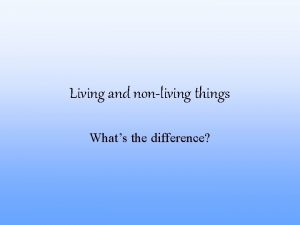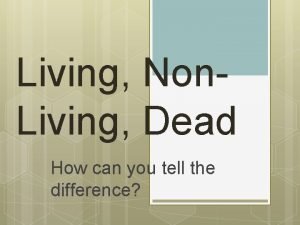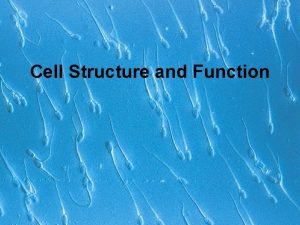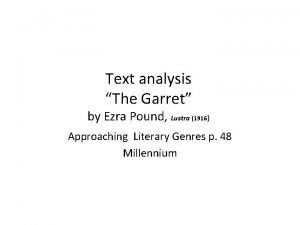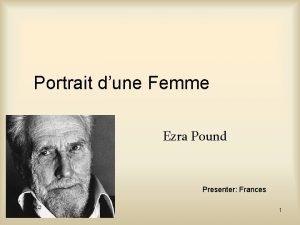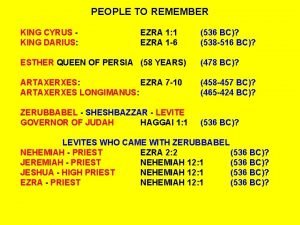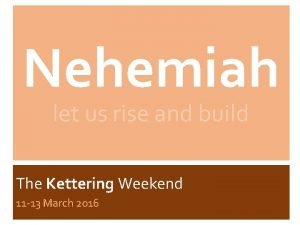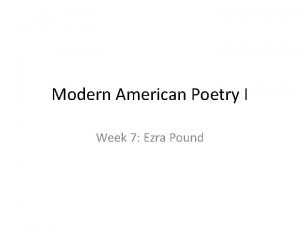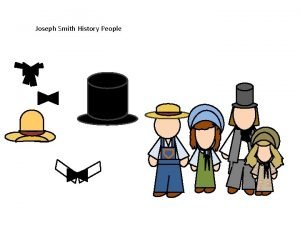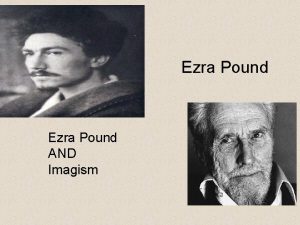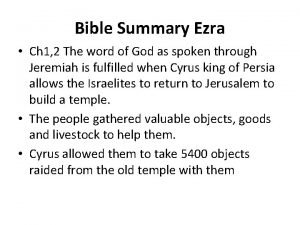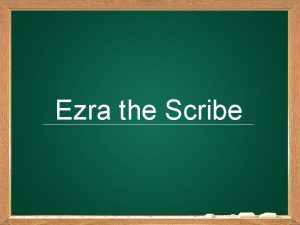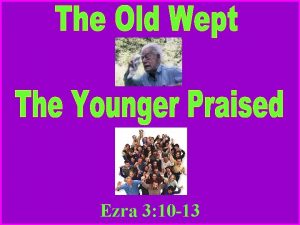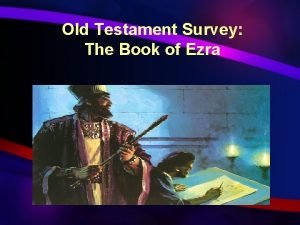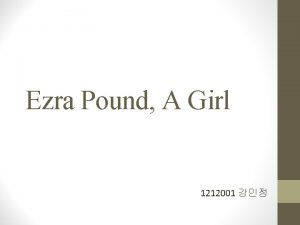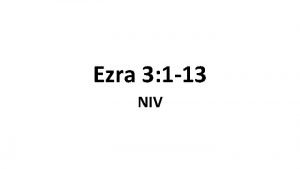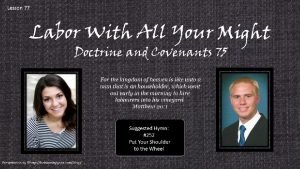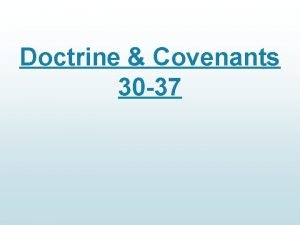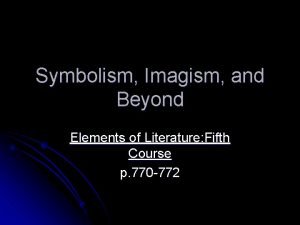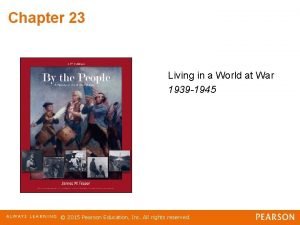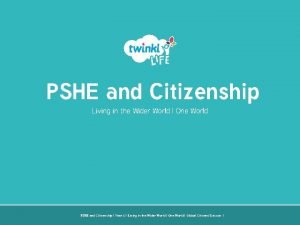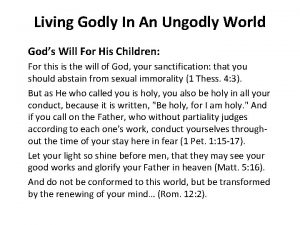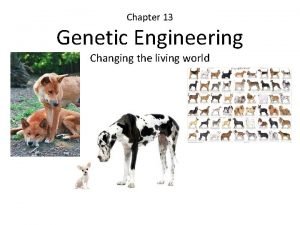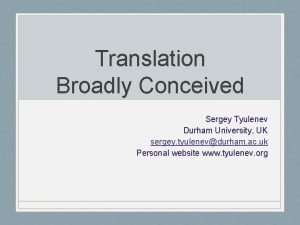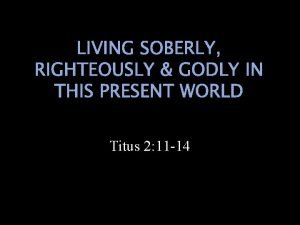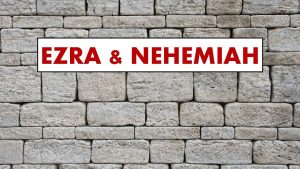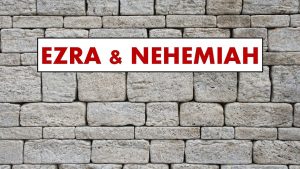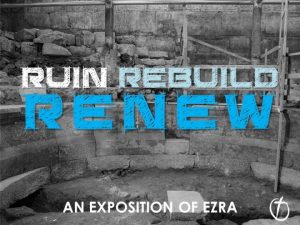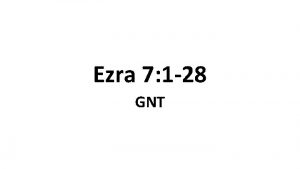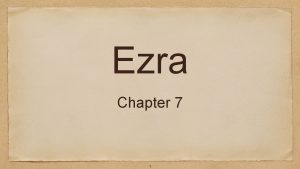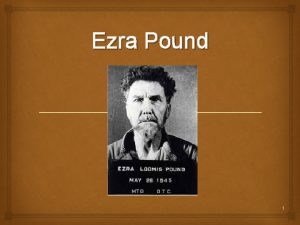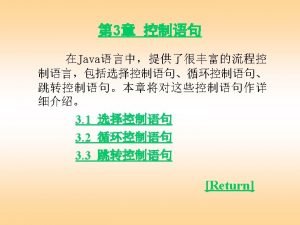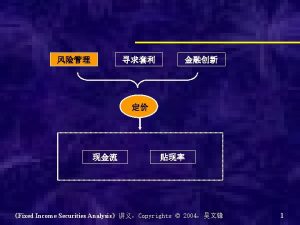Living in the PostExile World Ezra Return to
















































- Slides: 48

Living in the Post-Exile World Ezra: Return to the law Ruth: Live peacefully Esther: Clever success in foreign land Daniel: a new Joseph

Hebrew Bible Overview • Abraham, Jacob, Moses, Joshua, David, Solomon, Cyrus • Egypt, Desert, Judges, Conquest • (Kingdom, Divided Kingdom, Exile, Post Exile)

The Three-part Hebrew Bible The Law, Books of Moses, Pentateuch (Torah) • Genesis, Exodus, Leviticus, Numbers, Deuteronomy The prophets (Nevi’im) • The former prophets: Joshua, Judges, 1&2 Samuel, 1&2 Kings • The latter prophets: Isaiah, Jeremiah, Ezekiel; The scroll of the twelve: Amos, Hosea, Micah, Joel, Obadiah, Jonah, Nahum, Habakkuk, Zephaniah, Haggai, Zechariah, Malachi The Writings (Kethuvim) (written after exile) • Psalms, Job, Proverbs • The Festive Scrolls (Megillot): Ruth, Song of Songs (Song of Solomon), Ecclesiastes, Lamentations, Esther • Daniel, Ezra-Nehemiah, 1 -2 Chronicles

Diaspora. Jews living away from their homeland, among foreigners have new needs and new interests. How do The Writings help to address these?

Ezra-Nehemiah is a two-part book Ezra is a priest, rebuilds Jerusalem temple Nehemiah is a government official, rebuilds the wall around Jerusalem

The Book of Ezra • Ezra, the name means "God-helps" • Theme Ezra and Nehemiah tell about the return of the Jews from exile, and discuss re-establishing society, from religion to security. • Author Generally believed to be Ezra.

Characters • Ezra – The priest – Led some exiles to Jerusalem and solved the problem of mixed marriages • King Cyrus – King of Persia – Helped with the rebuilding of the temple • King Artaxerxes – King of Persia after Cyrus – Temporarily stopped the building the temple

• Zerubbabel – Governor, led first wave or returning Jews; laid the foundation for the Temple • Jeshua – First high priest, before Ezra – With Zerubbabel, led Jewish returnees from exile and began to rebuild the Temple • Haggai and Zechariah – prophets – supported Zerubbabel and Jeshua

Summary of Events by Chapter Chap. 1 -6 — Rebuilding of the temple Ch 1 Decree of Cyrus that the Jews could return (536 BC) Ch 2 Names of those who return Ch 3 Laying the foundation of the temple Ch 4 Local people oppose the work and move the king to stop it Ch 5 Prophets encourage work to resume; ask King Darius Ch 6 Decree of Darius: work resumes; temple completed Chap. 7 -10 — Return of Ezra and purifying the people from foreign wives Ch 7 Ezra decreed to lead another group to return (458 BC) Ch 8 Preparation and journey Ch 9, 10 The people put away wives and children of foreign blood

• God touched the heart of King Cyrus of Persia to allow the exiles to return • King Cyrus of Persia gave permission for the exiles to return

• Zerubbabel and Jeshua set to rebuild the temple of God • The governor and their associates wrote letter to King to continue rebuilding the temple.

• King Artaxerxes gave permission to people wanted to go to Jerusalem with Ezra. • King gave Ezra instructions on what to do with the offerings

• Ezra is dismayed at how the Israelites defile themselves through intermarriage with other nations • Ezra urged people to confess their sins and separate from their foreign wives.

Reminder • Return to Jerusalem • Spread of generation & living in unity • Rebuild the temple and restart the ceremonies • Turn back to God • Intermarriage forbidden

Megillot (Festive Scrolls) • Placed together in the “Masoretic Text” (MT) of the Hebrew Bible (around 700 CE) (The authoritative Hebrew Bible) • Five short books were chosen to be read publicly at the five main Hebrew festivals. • Esther and Lamentations are most commonly still read today. • They vary in style, tone, and content. • Together they present a multifaceted view of human nature. • No legalistic absolutes (like the Torah) • No certainties about God’s will (like the prophets) • God not mentioned much (except in Lamentations) • Different perspectives on handling life’s problems • Each affirms that life is good.

Megillot (Festive Scrolls) Book Ecclesiastes Esther Song of Solomon Ruth Lamentations Hebrew name of Holiday Sukkot Purim Pesach Shavuot Tisha B’Av Description of holiday Feast of Tabernacles or Booths (remember time in tents in wilderness) Purim or Festival of Lots (deliverance from Persian attack) Passover (end of slavery in Egypt) Pentecost (harvest festival) Fast of the Ninth of Av (mourning the destruction of Temple by Babylonians (587 BCE) and Romans (70 CE) Time period Autumn Early spring Spring Late Spring, Early summer Summer 19 Sept. 2013 中秋節 (this 16 -17 March 2014 15 April 2014 4 June 2014 4 August 2014 Date this year)

What do Esther & Daniel have in common? • • Written during the post exile. Hebrews triumph in foreign courts. Reminiscent of Joseph in Pharaoh's court. Encourages Hebrews to remain faithful in difficult times. • Expresses desire of Hebrews prevailing over Gentiles (non-Jews).

Ruth The Greatest story of filial piety. Ruth loves, and supports her mother-in -law, choosing to be a Jew, rather than return to her own family and people group.

Character Naomi Orpah Chilion Tribe of Judah Elimelech Mahlon Boaz Ruth Obed Jesse David

Story line : Ruth 1

Elimelech’s family goes to Moab • Famine in Judah • Naomi’s male relatives die

Naomi and her Moabite • Return back to daughters-in- law Judah • Naomi persuades Oraph and Ruth to go back to their families • Ruth chooses to stay with Naomi & return to Bethlehem

Part 2: Ruth meets Boaz Ruth and Boaz met in the harvest fields

Boaz shows kindness to Ruth & Ruth tells Naomi

My daughter, am I not to get you a resting -place where you may be in comfort?

Naomi’ s Plan Tonight Boaz is separating the grain from the waste in his grain-floor.

• Take a bath. • Rub your body with sweet oil. • Put on your best robe. • Go down to the grain-floor; but do not let Boaz see you.

• Take note of the place where he is sleeping, and go in there. • Uncover his feet, and lay down. • He will tell what you should do.

I will do all you say.

• Boaz slept at the end of the mass of grain after he finish his meal. • In the middle of the night, Boaz turned himself, and found a woman sleeping at his feet.

Whoa! Who are you? I am your servant Ruth; take me as wife, for you are a near relation.

• Boaz is impressed by Ruth’s virtue, but there is a closer relative. • He promises to marry her if the nearer relation doesn’t. • Ruth sleeps at his feet till the morning. • Boaz: Let it not be known that a woman came into the

Boaz gave Ruth six measures of grain in her robe.

The Marriage of Boaz and Ruth • Boaz suggests the next-of-kin to redeem Naomi’s parcel of Elimelech’s land in the presence of the ten men of the city. • The next-of-kin refused for it would damage his own inheritance. • They exchange sandals to give the right of redemption to Boaz. • The marriage of Boaz and Ruth

The Genealogy of David • Boaz took Ruth and she became his wife • Ruth bore Boaz a son, Obed, who became the father of Jess, the father of David. • The descendants of Perez: Perez→Hezron→Ram→Amminadab→ Nahshon→ Salmon→ Boaz→ Obed→ Jesse→ David

Themes and Meanings & Questions • • Chesed Emptiness and fullness Laws of "redeemer“ Intermarriage God’s Wisdom Calm, pastoral, family story One way to relate to the outside world

Esther A Jewish queen in a foreign country saves her people

Esther • Why does the narrator never mention God? • Is Esther Mordecai’s puppet? • Does it imply that for Israel to survive in a hostile world, they need to use their wits rather than rely on God? • Can we assume God is active in the background to make the story work out?

Setting • Set during the time of Xerxes 1 (Ahasuerus) son of Darius (486 -465 BCE) • Compare to Ruth. Not sensitive characterization, but an exciting melodrama (a sensational plot). • Mordecai is both a devout Jew and a loyal subject to the Persian king. • Esther has no trouble being completely assimilated. She hides her ethnicity/religion with no problem. (Daniel refuses) • Hebrews are an unassimilated group in Persian empire (Haman’s plot to destroy them reveals this). • Purim (cast lots): Haman casts lots to determine the day to exterminate the Jews. (Esther 3: 7)

The Triumph • Since the King can not take back his edict, he makes a second edict encouraging Jews to arm & defend themselves (8: 11). They achieve victory over all who would murder them on the very day that Haman had chosen for their extermination. • They “destroy, kill, and annihilate” those who would do so to them. Wow, redundancy for emphasis! (3: 13, 7: 4 & 8: 11)

Patriotic Fiction? • There is no record of a queen Vashti or a Jewish queen. • Persian empire was never divided into 127 provinces (8: 9). • No record of a decree either ordering the extermination of Jews or allowing Jews to attack Persian subjects • Mordicai, if he was deported to Persia from Babylon, would be at least 100 years old and Esther would not have been much younger. • Esther seems to be a variation of Ishtar, the Babylonian goddess of Love and fertility. • Mordecai seems derived from Marduk, the leading Babylonian deity. • The book is a clear cut depiction of Good verses evil in a classic mythic style. More important than historical accuracy is what the story represents. • A story of Jews turning the table on those who would destroy them. • It is a profound statement about the heroic resistance necessary, in the face of overwhelming anti-Semitism, to ensure Jewish survival at any place and at any time in the modern world.

Daniel Two distinct parts Chptrs 1 -6: collection of stories about Daniel & Friends Chptrs 7 -12: describes four visions

Daniel • Written in 200 BCE about an earlier time (600 BCE). • Written for encouragement during a time of persecution. • Like Joseph in Pharaoh's court – Transported to a foreign court and becomes second in command while remaining faithful to Yahweh. (No compromise or hiding, unlike Esther) – Rises in power because of his ability to interpret dreams. • Ch 1. He and friends remain very faithful to Torah rules, even their diet. (Vegetarians? )

Daniel 2 Nebuchadnezzar’s first dream • Head = gold (Babylon under Nebuchadnezzar), • Chest & arms = silver (Media); • Body & thighs = bronze (Persia), • Legs = iron (Greece), • Feet = iron & Clay (Egypt & Syria) • Meteorite is God’s kingdom that will never be destroyed.

Daniel 3 The Fiery Furnace • Shadrach, Meshach, and Abednego in the fiery furnace. • Jews heroically refuse to bow before the golden image. (remember Aaron’s golden calf) • “If our God whom we serve is able to deliver us from the furnace of blazing fire and out of your hand, O king, let him deliver us. But if not, be it known to you, O king, that we will not serve your gods and we will not worship the golden statue that you have set up” (3: 16 -18). What amazing integrity!

Daniel 4 Nebuchadnezzar's second dream • A tree that is cut down. Nebuchadnezzar gets the heart of a beast. • Daniel’s God humbles those who walk with pride (4: 34). • (Unfortunately, there is no record of any Babylonian King suffering a seven year fit of insanity, or converting to any form of monotheism). • Still, this presents the hope that an oppressive monarch could be taught humility before Yahweh.

Daniel 5 Belshazzar’s Feast • The writing on the wall. Daniels’ interpretations create puns out of the Hebrew words. • Mene, Mene: God has numbered the days of your kingdom and brought it to an end. • Tekel: you have been weighted on the scales and found wanting • Peres: Your kingdom is divided and given to the Medes and Persians. ”

Daniel 6 Daniel in the Lion’s Den • Follows the same pattern as in Daniel 3. • Also follows plot of Esther. – Punishment meant for Daniel happens to those who schemed against him. Plotters and family members fed to lions. Poetic justice. • This Darius goes farthest in promoting the Hebrew god. He orders everyone in his empire to learn to fear the Jewish Deity (6: 26 -28).
 Venn diagram living and non living
Venn diagram living and non living Yeast is living or nonliving
Yeast is living or nonliving Living non living dead
Living non living dead This organelle often ships proteins to the golgi apparatus
This organelle often ships proteins to the golgi apparatus Ezra pound lustra
Ezra pound lustra Portrait d'une femme ezra pound
Portrait d'une femme ezra pound Ezra 10:11
Ezra 10:11 Nehemiah timeline
Nehemiah timeline Ezra pound a pact
Ezra pound a pact Stephen burnett and eden smith
Stephen burnett and eden smith Ezra pound
Ezra pound Ezra bible summary
Ezra bible summary Bmg atlas
Bmg atlas Ezra the scribe
Ezra the scribe Ezra 3:10
Ezra 3:10 Ezra keys
Ezra keys A girl ezra pound
A girl ezra pound Rebuilding the altar of prayer
Rebuilding the altar of prayer 1 tesalonicenses 5:21-22
1 tesalonicenses 5:21-22 Turbo tax simulation
Turbo tax simulation Ezra thayne
Ezra thayne Ezra davis
Ezra davis Orson pratt
Orson pratt Imagism and symbolism
Imagism and symbolism Ezra edwards
Ezra edwards The garret ezra pound analysis
The garret ezra pound analysis Scott nguyen md
Scott nguyen md Chapter 23 living in a world at war
Chapter 23 living in a world at war Living in the wider world
Living in the wider world Living godly in an ungodly world
Living godly in an ungodly world Character of living world is
Character of living world is Parasitic heterotrophs
Parasitic heterotrophs Section 13-1 changing the living world
Section 13-1 changing the living world Sergey tyulenev
Sergey tyulenev Juice plus plant tower
Juice plus plant tower Soberly righteously and godly
Soberly righteously and godly Hát kết hợp bộ gõ cơ thể
Hát kết hợp bộ gõ cơ thể Bổ thể
Bổ thể Tỉ lệ cơ thể trẻ em
Tỉ lệ cơ thể trẻ em Gấu đi như thế nào
Gấu đi như thế nào Thang điểm glasgow
Thang điểm glasgow Chúa sống lại
Chúa sống lại Các môn thể thao bắt đầu bằng tiếng đua
Các môn thể thao bắt đầu bằng tiếng đua Thế nào là hệ số cao nhất
Thế nào là hệ số cao nhất Các châu lục và đại dương trên thế giới
Các châu lục và đại dương trên thế giới Công thức tính thế năng
Công thức tính thế năng Trời xanh đây là của chúng ta thể thơ
Trời xanh đây là của chúng ta thể thơ Mật thư tọa độ 5x5
Mật thư tọa độ 5x5
